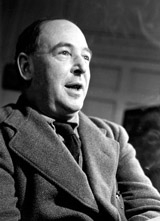What we can learn from C. S. Lewis about doing apologetics…

In a recent article for Christianity Today, Dr. Michael Ward explains how the combination of reason and imagination makes C. S. Lewis such an effective apologist in our post-Christian era. It is this combination that enables Lewis to make non-believers want what we Christians have.
Our challenge in the post-Christian world is not so much to prove that Christianity is true as to show that it has meaning, that it is not gibberish. Unless people see that Christian terminology actually makes sense and is not a foreign language, they are unlikely to care whether it is also true. And what is needed is not just dictionary definitions or brief illustrations, but an immersive story in which aspects of the Christian life can take hold in a person’s imagination. …
Life is more like a story than like an argument. And so, all things being equal, a storied presentation of Christianity will always be more effective than an argued one. But, of course, things are not always equal, and therefore the church needs both methods. Different people will have different callings, depending on talents and context. But even propositional apologetics should be as concrete as possible. Narrative apologetics, meanwhile, is not just imaginary. It is imaginative, relating at all times to reason, “the natural organ of truth.”
Both propositional and poetic apologetics point beyond themselves to the historical story of the incarnate God. …
In Christ, poetry and philosophy have met together. Meaning and truth have kissed. C. S. Lewis understood, like few in the past century, just how deeply faith is both imaginative and rational. That which God has joined, let no one put asunder.
“How Lewis Lit the Way to Better Apologetics” is available here. This article is an edited version of Dr. Ward’s essay in Imaginative Apologetics (Baker Academic, 2012). Michael Ward is senior research fellow at Blackfriars Hall, University of Oxford, and professor of apologetics at Houston Baptist University.


 December 4, 2013
December 4, 2013 







McGrath, in his recent biography of Lewis, makes approximately the same point. He says that postmoderns are geared to love story rather than proposition and thus Lewis came back into vogue under their watch over popular culture.
Thanks, Jeff! I’d love to read the McGrath biography–it’s gotten great reviews. Yes, along with McGrath, others have made similar comments about the postmodern preference for stories. Hopefully, their reading of Lewis will be close enough that they catch Dr. Ward’s main point: “C. S. Lewis understood, like few in the past century, just how deeply faith is both imaginative and rational. That which God has joined, let no one put asunder.”
I agree completely. Too many Christians believe that ours is a blind faith. I made points to the contrary in my article, ‘Do Christians Need Apologetics?’ http://thereforegodexists.com/2013/06/do-christians-need-apologetics/
Richard, thanks for commenting. I took a look at your site and would consider your work to be on the rational or reasoned side of apologetics. Have your ever considered how you might add a more imaginative or literary dimension to your apologetic? I like to think that much of my work with The Humanitas Forum is a third apologetic option, cultural apologetics. It has the goal of seeking to understand how heads, hearts, and loves are shaped by the experiences of everyday life–experiences that either inhibit or facilitate a healthy life of Christian faith.